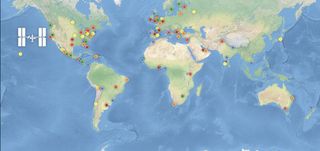NASA Space App 'Hackathon' Launches in NYC This Weekend

NEW YORK — NASA is hosting its third annual International Space Apps Challenge this weekend, a global hackathon-type event that pits teams against one another in a fun contest to come up with solutions to address real needs on Earth and in space.
The two-day Space App Challenge event, scheduled to take place at nearly 100 different locations across six continents, will bring people together to tackle 40 new challenges based on NASA's goals and mission priorities.
The challenges fall into five categories — Earth Watch, Technology in Space, Human Spaceflight, Robotics and Asteroids — and include tasks such as figuring out how to turn a smartphone into a nanosatellite; designing high-tech "smart accessories" for astronauts; conceptualizing designs for a deployable greenhouse for missions to the moon or Mars; and creating an open-source network of robotic telescopes to perform quick follow-up observations of potentially threatening asteroids. [10 Best Space Apps in the Universe]
"The idea of a Challenge is so compelling because it acknowledges the fact that the world is facing serious challenges — and that we all have to work together to approach them," event organizers wrote on the official Space App Challenge website. "While there are prizes offered for great solutions, the main challenge we focus on is enabling 48 hours of highly engaged collaboration — and discovering what we can create when that happens."
This year, the Space App Challenge's main event will be held tomorrow and Sunday (April 12 and April 13) here in New York City.
In the United States, teams will be competing from Cambridge, Mass., Baltimore, Chicago, Kansas City, Mo., Pittsburgh, San Francisco, and several other cities. Internationally, the event will include participants from Qatar, Greece, South Africa, New Zealand, Nigeria, Ireland, Spain and the United Kingdom.
NASA astronaut Douglas Wheelock and Italian astronaut Paolo Nespoli will also host a Google+ Hangout during the hackathon tomorrow (April 12) at 12:30 p.m. EDT (1630 GMT). Members of the public can participate in the live Hangout, or pose questions to the spaceflyers using the hashtag #spaceapps.
Get the Space.com Newsletter
Breaking space news, the latest updates on rocket launches, skywatching events and more!
Local prizes will be awarded at each venue in the following classifications: Best Use of Data, Best Use of Hardware, Best Mission Concept, Galactic Impact and Most Inspiring. Then, a panel of NASA judges will select winners from each of the five finalist categories. Each local venue will also be able to nominate a team for the People's Choice award.
For more information about the event, including how to get involved, visit http://spaceappschallenge.org/
Follow Denise Chow on Twitter @denisechow. Follow us @Spacedotcom, Facebook or Google+. Originally published on SPACE.com.
Join our Space Forums to keep talking space on the latest missions, night sky and more! And if you have a news tip, correction or comment, let us know at: community@space.com.

Denise Chow is a former Space.com staff writer who then worked as assistant managing editor at Live Science before moving to NBC News as a science reporter, where she focuses on general science and climate change. She spent two years with Space.com, writing about rocket launches and covering NASA's final three space shuttle missions, before joining the Live Science team in 2013. A Canadian transplant, Denise has a bachelor's degree from the University of Toronto, and a master's degree in journalism from New York University. At NBC News, Denise covers general science and climate change.
